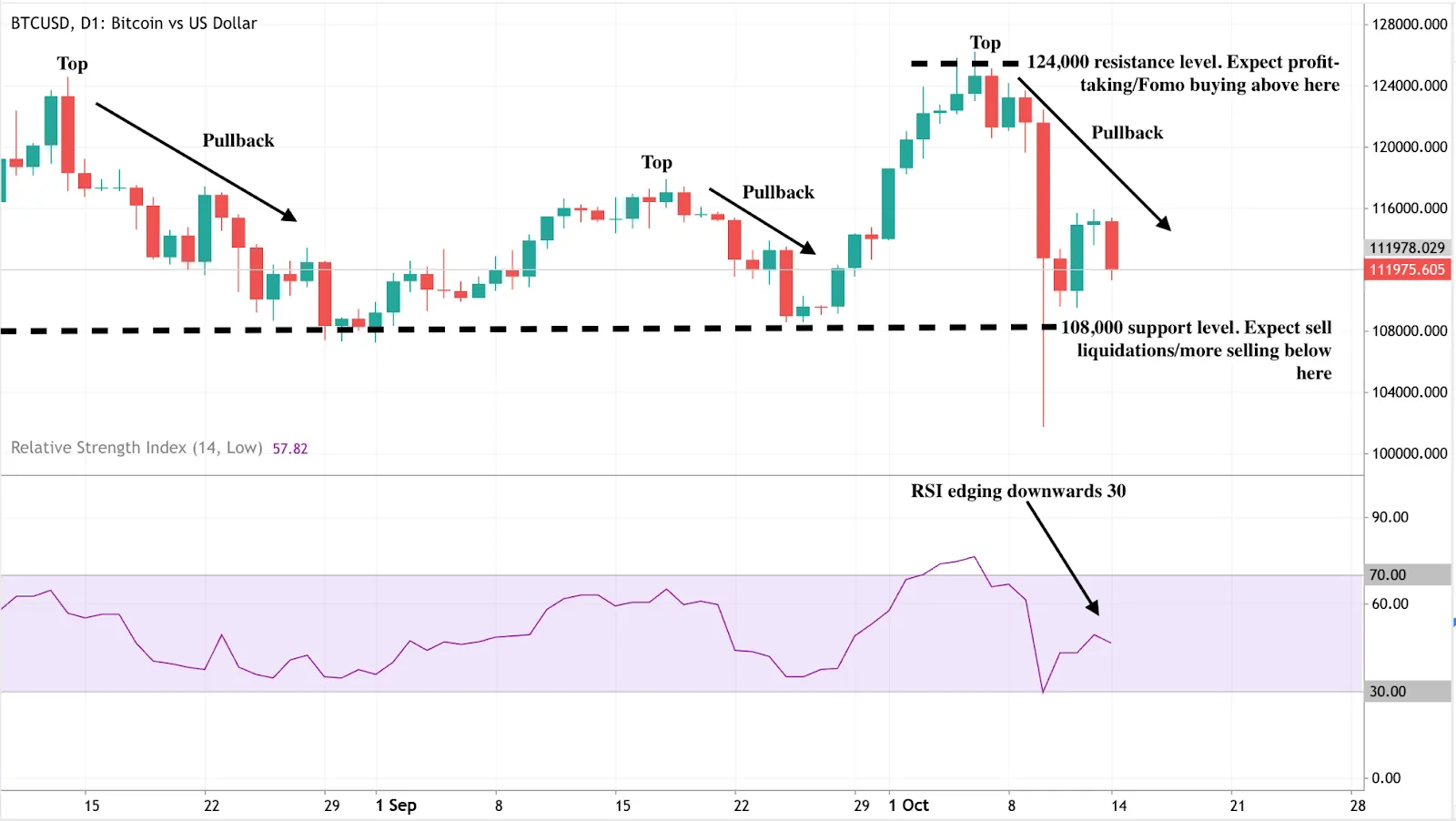Was the $19 billion Bitcoin price wipeout a fakeout before a late 2025 moonshot?

Analysts say Bitcoin’s $19 billion October sell-off was likely a fakeout rather than the start of a new bear cycle. The cryptocurrency’s rapid rebound from $107,000 to $116,000, combined with stabilising macro conditions and renewed institutional inflows, points to a temporary shakeout before a potential year-end rally. Still, whether Bitcoin can reclaim $125K and push toward $150K next will depend on how the market responds to fading leverage, shifting sentiment, and lingering geopolitical uncertainty.
Key takeaways
- $19 billion in crypto liquidations followed Donald Trump’s 100% tariff threat on China.
- Bitcoin rebounded 8% within days as U.S.–China tensions eased.
- Analyst Ash Crypto’s forecast—a drop to $106K followed by a surge to $150K - remains on track.
- Institutional sentiment continues to strengthen, while retail traders stay cautious.
- Volatility resets could set the stage for a new Q4 rally if momentum holds above $115K.
Bitcoin market crash 2025: The $19B liquidation and recovery
Bitcoin’s October sell-off was one of the most severe since early 2024. Triggered by President Trump’s 100% tariff announcement on Chinese imports, it sent shockwaves through risk assets and wiped out billions in leveraged positions. Bitcoin plunged to $107K, while Ethereum dropped below $3,500, prompting the liquidation of more than $19 billion in crypto holdings.
The panic briefly rippled into stablecoins. USDe, one of the largest by market cap, momentarily depegged to $0.65 on Binance before quickly recovering to parity. Once Trump softened his tone and U.S. Treasury Secretary Scott Bessent confirmed that trade talks had “substantially de-escalated,” investor sentiment improved. Bitcoin recovered to $116K, showing that institutional demand remained resilient despite the turbulence.
Bitcoin price prediction 2025: Ash Crypto’s prediction
At the start of October, research analyst Ash Crypto predicted that Bitcoin would correct toward $106K and Ethereum to around $3,800 before resuming their upward trend. Both targets were met during the sell-off, validating the first half of his forecast.

He maintains that the correction represents a “fakeout before the breakout”, projecting that Bitcoin could reach $150K by year-end, triggering a renewed altcoin season in Q4 2025.
Ash revealed that he is currently 85% invested in the market to capture near-term upside, while keeping 15% in cash to “buy the dip” should another correction occur. He expects a reversal to start in the final 10 days of October, to continue the uptober trend, as market pessimism peaks and leverage resets.
Bitcoin institutional investment offsets retail fear
Institutional participation remains a defining feature of this cycle. While retail traders continue to trade reactively, large financial firms are expanding their exposure:
- Morgan Stanley is preparing to extend crypto trading through its E-Trade platform.
- JPMorgan is advancing plans for a stablecoin initiative, despite CEO Jamie Dimon’s long-held skepticism.
- Invesco’s Chris Mellor describes Bitcoin as “digital gold,” citing its low correlation with traditional assets.
- Nigel Green, CEO of DeVere Group, argues that Bitcoin’s volatility has become “productive,” signalling a more mature market.
Meanwhile, Hargreaves Lansdowne, the U.K.’s largest retail investment platform, maintains a cautious view, stating that Bitcoin should not form part of long-term portfolios due to its high volatility and lack of intrinsic value. This divergence between institutional optimism and retail caution underscores a market in transition - maturing but still fragile.
The fakeout pattern and market psychology
Analysts argue that Bitcoin’s price action fits a classic fakeout pattern, where sharp declines flush out leveraged positions before a reversal. Similar events in past cycles lend credibility to the theory:
- In 2020, a 20% correction preceded Bitcoin’s rally to $60K.
- In 2023, a 22% pullback led to record highs within three months.
Ash Crypto and others believe the latest decline follows this script - a phase of forced liquidation followed by strategic accumulation. When pessimism reaches its peak, they say, the market often stages its strongest rallies.
Bitcoin technical analysis 2025
At the time of writing, sellers appear to be in control on the daily chart despite Bitcoin’s recent rebound from $107K. The chart is forming what looks like a potential triple-top pattern, a traditionally bearish signal that often precedes trend reversals.
This narrative is reinforced by the Relative Strength Index (RSI), which is trending lower toward 30, suggesting increasing sell pressure and weakening bullish momentum.
If prices inch lower and breach the $108,000 support level, it could confirm the triple-top formation and trigger another wave of selling, potentially pushing prices toward deeper correction zones. Conversely, if buyers regain control and a fakeout is confirmed, a sharp uptick could face resistance near the recent highs of $124,000, which remains the key barrier before a move toward the $125K—$150K range can resume.

How to trade Bitcoin’s volatility on Deriv platforms
Bitcoin’s price swings offer trading opportunities across multiple Deriv platforms. Traders can take advantage of high volatility using Deriv MT5 (DMT5)’s advanced order types and customisable charting tools.
- On Deriv MT5, traders can use stop-loss and take-profit orders to manage exposure efficiently during sharp moves. The platform’s multi-asset interface also allows traders to monitor correlated assets like Ethereum or Gold for intermarket insights.
- For traders seeking lower-risk exposure, Derived Indices - synthetic markets that mirror crypto volatility without external news risk - can be used to practice similar strategies.
- You can also explore our trading calculators to estimate margin and profit potential before placing positions.
Whether you prefer manual setups or automated systems, Deriv’s platforms give traders the precision and flexibility needed to trade Bitcoin’s volatility with confidence.
Bitcoin investment implications
For traders, the current setup suggests a market reset, not a reversal.
- Short-term opportunities may lie in buying near $110K–$112K support levels while watching for confirmation above $125K.
- Medium-term investors may benefit from gradual accumulation, as institutional participation signals deeper market maturity.
If current forecasts hold, the October fakeout could mark the start of Bitcoin’s next major leg higher, positioning Q4 2025 as a potential launchpad for its long-awaited moonshot.
The performance figures quoted are not a guarantee of future performance.



